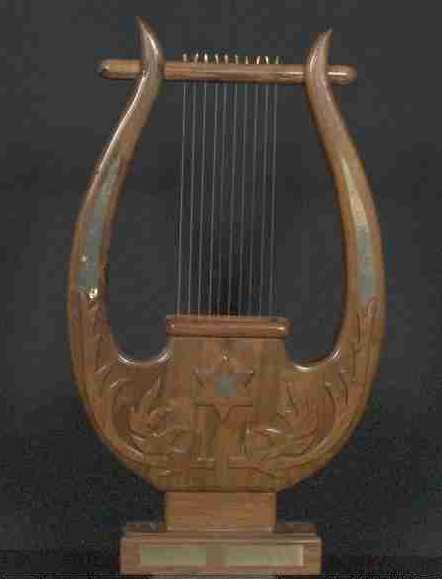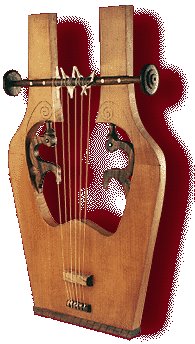Cards In This Set
| Front | Back |
|
Lyre
|
 Oldest stringed instrument (3000 BC); made from cattle horns and tortoise shell (used from resonance). Had 7 strings. Found in Mediterranean area, spreading into the rest of Europe; ancestor of violin; symbol of Apollo (calm, reasoned, restrained). |
|
Kithara
|
 Large lyre with wooden soundboard and flat base; from Greece ~400-600 BC; used in procession as a solo instrument. Ancestor of the Guitar. |
|
Aulos
|
 Ancient Greek wind instrument; none survive except in art; seems to have had two pipes and a double reed. Used to worship Dionysus. |
|
Doctrine of Ethos
|
(Greece 300 BC) Aristotle's idea that music effects behavior; certain types of music could effect one's ethical or moral perception and actions.
|
|
Pythagoras
|
(died ~500 BC) Greek founder of music theory; established ideas of pentatonicism (intervals of fifth, fourth, octave) harmony, rhythmic ratios.
|
|
Office
|
Daily cycle of prayers specific to the hour of the
day; began in 500s Christian churches in Europe; included psalms, antiphons,
chants, Bible readings, and prayers; usually prayed in monasteries and convents
but also in normal churches
|
|
Hours
|
Another name for the divine office
|
|
Proper
|
Text for mass that changes based on the season or
feast day. Chants are named for their function
|
|
Ordinary
|
Mass text that is normal and used at every service.
The ordinary does not change for special holidays or feasts but remains the
same. Variation in melodies may occur. Chants are named by their
text.
|
|
Liber Usualis
|
Complete book of church service music (including
chants) published by the Solesmes monks in 1896; follows the Council of Trent’s
orders on important Bible readings, psalms, and chants for specific feasts (in
the Temporale), saint days (Sanctorale) and masses (funerals, weddings, etc.);
|
|
Mass
|
A service in the Roman church based on the Last
Supper. Mass is significant because most early music was written for masses.
|
|
Boethius
|
6th century member of Roman senate; Latin paraphrasing
of Greek writings in the areas of math, music (specifically tuning, acoustics,
proportions), and astronomy
|
|
Cantillation
|
The chanting of sacred texts, originally in ancient
Jewish synagogues; melodies and phrasing reflected phrases of the texts; may
have led to Christian chants but we can’t know for sure because nothing was
written down till much later;
|
|
Introit
|
The entrance psalm in a Medieval mass; accompanied the procession of the priest and his assistants; formula: 1. antiphon 2. verse 3. gloria 4. repeat 5. antiphon
|
|
Evovae
|
Latin for "World Without end"; used at the end of the Gloria Patri
|



